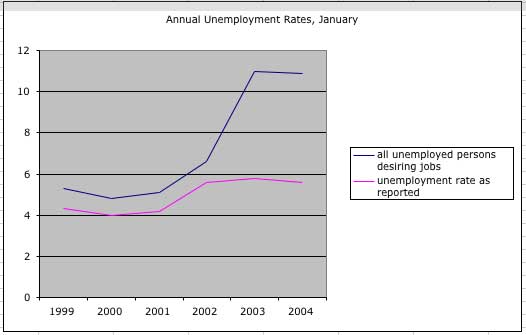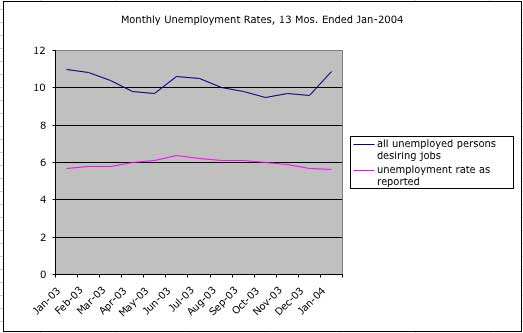February 21, 2004
Maybe It's Just Me
...but this is the funniest thing I've seen this week:
This publication obtained audiotapes of two meetings conducted by recently departed ad sales EVP Lisa Brown. In them, she repeatedly launches into obscenity-laced tirades, personally insults senior executives in her group, and at one point, pounds her shoe on the table, Khrushchev-style, when a creative director from a longtime AOL vendor speaks out of turn.
I would pay good money to actually SEE Lisa Brown doing the Krushcev-style shoe pounding, but sadly, these are audio tapes. The letter saying she was leaving indicated no disgrace whatsoever, just the usual "leaving to persue other opportunities" thing. No doubt she will go on to some other company where she will continue her shoe-pounding antics.
The source of the quote is here.
Posted by nicole at 10:21 PM
February 20, 2004
Failing Business Model Blames Customers, Regulators
On Tuesday, Don Henley, yes that Don Henley, wrote an opinion piece for the Washington Post called Killing the Music. While he's certainly right that the music business is in trouble, I don't think he truly understands why. I suppose he could be forgiven for getting it wrong. The music business certainly gets it wrong. From the article:
Music stores used to be magical places offering wide variety. Today the three largest music retailers are Best Buy, Wal-Mart and Target. In those stores shelf space is limited, making it harder for new artists to emerge. Even established artists are troubled by stores using music as a loss leader. Smaller, more personalized record stores are closing all over the country -- some because of rampant P2P piracy but many others because of competition from department stores that traditionally have no connection whatsoever with artists.
Wal-Mart, et al did not kill independent record stores. Amazon and EBay's half.com killed independent record stores, and they were aided and abetted by the record companies themselves. The prices they charge for new CDs are simply ludicrous. I had all but stopped buying new CDs more than ten years ago because in Chicago, I could always find what I wanted used. There was a huge market for used CDs there, and they were always sold by independent record stores. I had no reason at all to shop at Tower or Sound Warehouse, except to rent movies.
I never found a decent used store here. The stock was always a huge disappointment. I bought some things at Tower, but was horrified at how much I paid. I think this is what it's like for folks who don't live in a big city. Once I discovered half.com, I started buying records again and the selection was exponentially bigger than it had been at Reckless in Chicago. Amazon's lack of a physical location has pushed down the margins on CDs to the point that they are a bit more reasonable new, but they also have people selling "used" that are actually selling new merchandise at an even cheaper price. This is also true for books.
When an industry blames it's customers for it's demise instead of it's own crappy business model, you know they've reached the nadir. Piracy is not the huge problem the record companies make it out to be. Most piracy (not all, I know), and I think this is true for movies too, is committed by people who wouldn't buy anyway. In some cases, it's kids who don't have credit cards and can't buy from Amazon and Half. Systematic piracy operations occur when foreigners who can't obtain media legally obtain it from pirates. I think this is most of the movie piracy, but that's a discussion for another day.
P2P is the modern day equivalent of people who make tapes for their friends. The quality is similar, and no matter what you may read in the media, like making tapes, it takes time to find and download what you want. I know for a fact that some people download a few songs and then buy a used copy. When I can, I use iTunes to get the material because it's much, much faster than messing about with LimeWire. This is the same set of steps I went through when friends made me tapes. The huge disadvantage for the record companies is that now, I don't need physical proximity to get that tape. I don't even need to know the person making it. I don't need a physical record store at all, and the used stock is infinite. This is a huge change in the market place, and it's one they have simply ignored in favor of whining about piracy.
So, how should they make money? I don't know, and I don't care. I'm the customer, and that's not my problem. Some artists are going around them, and more power to them. It would be easier for them if the record companies would get the hell out of the way. Until the "industry" gets it's collective head out of it's collective ass, it certainly won't figure it out.
Posted by nicole at 09:30 AM
February 06, 2004
Unemployment Statistics and What They Don't Tell You
As you may or may not know, the Bureau of Labor Statistics do not count certain unemployed persons in the splashy, front-page unemployment number. These people are described as follows: "In some month, about n persons were marginally attached to the labor force...These individuals wanted and were available to work and had looked for a job sometime in the prior 12 months. They were not counted as unemployed, however, because they did not actively search for work in the 4 weeks preceding the survey." So, these people want work, but didn't look during the month they did the household survey. Some economists and analysts refer to this as the "real" unemployment rate. For January, the reported rate is 5.6% and the "real" number is 10.9%
Historically, this number looks like this (these figures are for January of each year since that's all there is for 2004 and to make sure we are comparing seasonal apples to seasonal apples):

I wanted to go back to where we are firmly in the boom we all remember. As I recall, in early 2000, you could get a job at a NoVA telecom company if you could *spell* buzzwords like Java and Oracle. That ended in either January or March of 2000, depending whom you ask.
Here's last year's trend (13 months, January 2003 to January 2004):

I'm sure Wall Street is celebrating the improvement from December 2003, although the number came in lower than expected. I'm no expert, but these graphs certainly have a story to tell. The increase in real unemployment is a virtual spike, while the reported numbers show a less severe change. The really relevant thing here, I think, is that second graph. The trends are actually *opposite* one another, showing a worsening of the situation in recent months.
Regarding the job *creation* numbers (which, while released at the same time, are a different thing all togther), the Bush Administration would have us believe that the BLS has a known failure in that they don't measure small business and self-employment job creation accurately. If that's the case, why are so many people, an increasing number actually, still reporting that they can't find work?
all numbers courtesy of The BLS Employment Statistics Page
Posted by nicole at 10:29 AM
February 01, 2004
Sportsmen Turn Against Bush
Bush's decision to open the Tongass National Forest (in Alaska) to logging has officially bitten him in the ass. From USA Today:
The tree-huggers fume that government subsidies to the timber industry cost taxpayers hundreds of millions, and the nearly 5,000 miles of existing logging roads are enough. But a powerful rumble of discontent is growing from what seems, at first glance, an unlikely source. Just weeks before the exemption was declared, Dale Bosworth, chief of the Forest Service, received a petition from the Northern Sportsmen Network of Juneau, Alaska. It was signed by 470 gun clubs from across the USA, 40 of them based in President Bush's home state of Texas.
It makes me feel a whole lot better to know that there are some right-wingers that are pro-wilderness. With all the ANWR argument, I was starting to wonder.
The wilderness is part of our legacy, and it would be a shame to destroy some of the last remaining bits of it. Our culture gets more intense all the time, it seems, and I like to know the wild is there to refresh me when I need it. Living in the eastern mountains has taught me to enjoy the woods and share it with the sportsmen who love it as much as I do.
Posted by nicole at 09:31 PM

